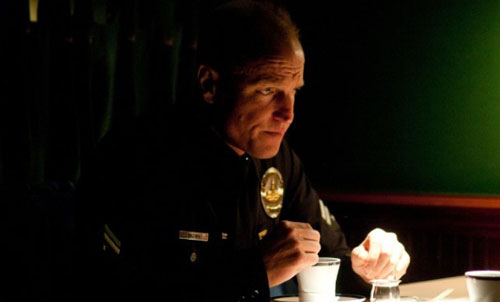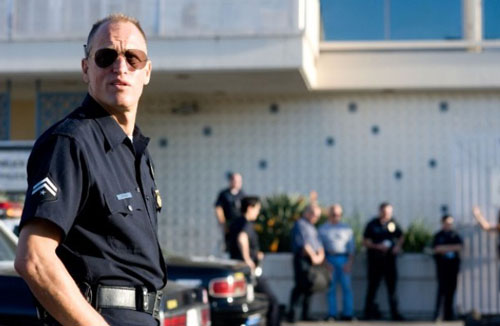
Dave Brown, the booze, pill and testosterone-fuelled antihero of Rampart, is one of the filthiest cops we’ve ever seen on screen — thuggish like Russell Crowe’s Bud White in LA Confidential, more unhinged than Harvey Keitel’s Bad Lieutenant, and as shamelessly decadent as Denzel Washington in Training Day.
He is one of the most unpleasant characters with whom you could spend two hours in a cinema, yet he is transfixing because of an astonishing performance from Woody Harrelson. Gaunt and crazy-eyed, Harrelson coats the misanthropy and self-loathing of the bullying Los Angeles police officer with an easy charm that makes him as fascinating as he is odious.
Like Training Day and The Shield, Rampart is inspired by a corruption scandal that rocked the Los Angeles police department in the late 1990s. The film is set in 1999 against the backdrop of allegations of police corruption and brutality against many of the members in the anti-gang programme of the Rampart division.
Dave — called “Date Rape” because he bumped off a serial rapist without much regard for due process — is an easy target for police brass who want to show that they’re serious about cleaning out the rot. When he is caught on video beating a suspect senseless, Dave has to face up to the fact that his career as a renegade cop could be over.
His home life is no less sordid than his dirty work on the streets of LA. Dave lives with four women who hate him — two sisters (Cynthia Nixon and Anne Heche) and a daughter by each of them. Even his friends don’t seem to like him much. His seedy mentor (a commanding performance from Ned Beatty) treats him with cool disdain and a world-weary defence lawyer (Robin Wright) seems to have embraced her affair with him as a form of self-punishment.

Crime novelist James Ellroy co-wrote the script with director Oren Moverman, his touch showing in Rampart’s stylised, pungent street dialogue and acrid portrayal of moral decay. Rampart also has an outstanding support cast, including Ice Cube, Sigourney Weaver and Steve Buscemi, many of whom are not given nearly enough screen time.
Moverman, who worked with Harrelson in The Messenger, is unflinching in his portrayal of Dave’s debauchery and brutality. He has flair as a director, but lacks economy. His camera work is distractingly gimmicky at times — Moverman seems unable to resist gratuitously odd angles, slow zooms and whiplashing camera movements.
Rampart is a film to admire for its tough vision more than it is a film to enjoy. There isn’t much in the way of plot — which is unusual considering how labyrinthine Ellroy’s explorations of police politics can be — and there isn’t much action or humour to serve as a hook. It is an uncompromising character study of a dirty cop, who as one of the sisters he lives with puts it, dirties everyone around him.
Rampart trailer (via YouTube):
http://www.youtube.com/watch?v=SGHPD3IYnd0
Is Dave a product of the institution he works for, a cog in the wheel, or a racist thug who found his calling as a petty tyrant of the streets by joining the police department? Or he is just a man who has seen too much of the dark side of human nature? Rampart does not really seem to offer an answer. He is a force of nature that tears through the world like a hurricane.
Dave spends the film sinking deeper into a morass of degeneracy and violence, floundering in his own corruption. Rampart slithers off screen with no real resolution, perhaps because Dave is beyond punishment or redemption. That the lack of catharsis leaves you disquieted and unsatisfied may be the point. — Lance Harris, TechCentral
- Subscribe to our free daily newsletter
- Follow us on Twitter or on Google+ or on Facebook
- Visit our sister website, SportsCentral (still in beta)




